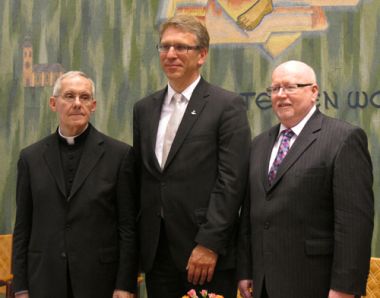Rehabilitating evangelicalism: Geoff Tunnicliffe on 10 years of leading the World Evangelical Alliance

Geoff Tunnicliffe, the Secretary General of the World Evangelical Alliance, is preparing to step down after 10 years at the helm. Christian Today caught up with him to hear more about some of the challenges and trends in evangelicalism today.
CT: Why did you decide now was the time to step down from the WEA?
GT: For me the process leading to the decision I made to step down started over a year ago in conversation with my wife. There were two sides of the equation. First, there is the question of what's best for the WEA at this point in history. There is the question of the need to see younger leadership.
This is one of those big milestone years for me, I turn 60 this year. I have a desire to finish well the work I began with WEA and to see a good transition to younger leadership who would take the WEA to the next stage of the journey, as it were.
On the personal side, I think the issues of travelling 200,000 miles a year, being away from family, and health issues related to that, all these sorts of things have impacted my decision to some extent. And there's just simply asking the Lord, and I think he's saying that my time with the WEA, at least in terms of my place in the CEO's role, is coming to an end, and so now is the time for me to oversee a good transition of leadership.
Transitions in all organisations, be they religious or charitable or commercial or anything else, are difficult enough at the best of times. I wanted us to be able to model as good and easy a transition as possible. So I gave our international council as much time as possible to make this decision, so it's not seen as a crisis or somehow anything urgent, but it's all just part of the rhythm of the organisation.
CT: Over the 10 years you've been head of the WEA, what would you say have been the most substantial issues in the global evangelical community.
GT: I think there are many. At the core of who we are in the WEA is a commitment to build on Christian unity. There are many elements in that. For us, in this often fractured community of evangelicals, the important questions are how we recognise our differences and at the same time acknowledge our commonality, and how while doing both of those things, we find a way to work together.
Even the word evangelical gets misused by many or misunderstood by others. I think it's been about people better understanding who we are as evangelicals, and almost a rehabilitation of the word. We're committed to engaging with culture, participating in society, on the most important issues.
Religious liberty, which continues to be under threat in many parts of the world, is important to us, but there are also new areas like peace building and reconciliation, nuclear weapons issues, the arms trade, extreme poverty issues. We as evangelicals have something to contribute to the conversation and something to contribute to society.
One of the shifts that I've seen over this last decade has been what I call connecting Sunday to the rest of the week. It's about encouraging Christians to engage where they're at. In business, in marketing, in media, in healthcare, in entertainment, whatever it is. I call it the need for the ongoing reformation.

The other area that's been relatively new and unexplored for evangelicals is our engagement with the larger Christian family. With the Catholics and the World Council of Churches, but also beyond that with other faith communities. We can now sit with them and dialogue with them in very important conversations.
I think comparing where we are now with where we were ten years ago, we're in a very different place of engagement. We've not given up our theology, rather we've built on the rich history that theology comes with.
CT: What do you think have been some of the hardest issues to deal with in terms of unity in the evangelical community? What has been the most divisive?
GT: Well when you boil everything down, evangelicals are actually very similar and all have the same kinds of commitments - our commitment to a trinitarian God, our commitment to evangelisation, our commitment to the work of Christ bringing redemption individually to people's lives.
It's in the nuances of the practice of our faith where division comes. For some who want to narrow the tent, to say who is in and who's out, who say things like "if you follow this person, you're out" and "if you like this person, you're in", for me there's a great sadness to that, and I think some of this has been fuelled by social media.
The lack of civility sometimes is one of the most disturbing things to me. Even in our own evangelical community, sometimes if you don't dot all the same i's and cross all the same t's, you will be outside the circle. And for many people then, it is okay for people to be rude to you, they can condemn you, and attack you on all kinds of social media, and do so anonymously. That's troubling to me.
I've seen far too many unkind and unjust comments, not just against myself, but my friends as well. These are people who are all wonderful followers of Jesus, but they fall victim to the rumour mill and the blogosphere.
The upside to this new global communication is that we're more connected than ever before. But the downside is that rumours that are completely untrue can start in one place and be around the world in an instant like wildfire.
This happened at our conference in Bethlehem, Christ at the Checkpoint. People assumed things about what I was going to say before I'd even said them. They assumed I've taken sides, that I must be pro-X or anti-Y, but that's not true. I spoke to representatives of the Palestinian government and the Israeli government. I've heard from everyone, from rabbis to Palestinians on the street.
There's this fear of engagement, and that's one of things we've got to overcome as evangelicals. If we're strong in the foundation of our faith, we don't have to fear engagement with anyone. Our faith stands up to all. We can talk to imams, we can talk to heads of states in Islamic countries. We can talk to people who many would say are our enemies. We can do this because our faith stands strong.
That's the part of evangelical disunity that concerns me. I'm told that if I meet with a certain political figure, I'm meeting with the enemy. I'm not sure Jesus would have said that. I believe we can have redemptive conversations even if we have great disagreements with someone's philosophical, theological, or political view.
CT: What particular biblical principle have you seen the evangelical community struggling with do you think?
GT: I think the biblical principle we need to better work with in the future is what I would call biblical engagement. There's several elements of that.
One is even though there are more Bibles available today than ever in the world, there seems to be more biblical illiteracy. This shows us how we need to better connect Sunday to the rest of the week.
Scriptures need to become transformative of the way we conduct our everyday business. But there seems to be this ongoing bifurcation, this weird trend of living in two worlds.
It almost goes back to Plato, and this idea that there are two worlds, the spiritual and the material, and never the two shall connect. But Jesus and the Bible encourages engagement with both.
Also, there is a question about the biblical principle of loving our neighbour, and what that means. Too often it is the fear of our neighbour, fear of the other.
We have to push ourselves to think about what it would mean to love someone who we disagree with philosophically or theologically or politically. Often times, scripture is read through our own cultural prism, and we need to sometimes break out of that and love people more radically.
CT: Conversely, to take a more optimistic angle, where do you think the evangelical community is doing well in engaging with the Bible?
GT: I am much more optimistic now about engagement with culture than I ever have been. I see Christian leaders, evangelical leaders around the world engaging with the biggest issues and the biggest problems, and that gives me hope.
I think of my amazing colleague Bishop Taban who heads the Evangelical Alliance in South Sudan. A former child soldier, part of the liberation army, now one of the biggest proponents of arms restrictions and peace in that country. He's just recently been given the Clinton Global Initiative Award.
Or I think of the person who leads our task force on nuclear disarmament, Tyler Wicks Stevenson who was a disciple of John Stott. This young man with this passion and vision for evangelicals to engage in this important global peace building process.

I think of our new engagements with the problems of policy around poverty have been a really positive development.
Evangelicals have always been very good at building hospitals and caring for the poor at the grass roots level. Where we're not so good is engaging with policy and bad governance and corruption. Now we're engaging in that level, dealing with corruption and abuse of power, that gives me great hope.
I've had amazing conversations with business leaders, who are hugely influential. They come to me and and say: "We have these great platforms and we want to use them for good. We don't want to be seen as ATMs for the church, but we want to use our business for nation building and Kingdom impact."
Here's another shift that's taken place. The global institutions like the UN and the World Bank are asking us to engage like never before. They're taking our voice seriously like never before. That's completely new.
I'm convinced there are more and more opportunities for us to bring Kingdom influence to every sphere of society than there ever has been.
Evangelicals have an amazing opportunity right now to work together for the common good as we seek to share the love and hope of the Gospel.











